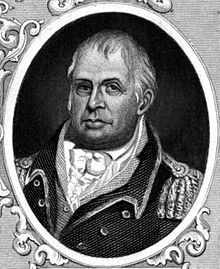William Heath (politician)
William Heath (born March 7, 1737 in Roxbury , Province of Massachusetts Bay , † January 24, 1814 ibid) was an American farmer, soldier and politician from Massachusetts . He served as a major general in the Continental Army during the American Revolution .
Life
Heath spent most of his life on his family's farm in Roxbury. His family established the farm in 1636, and he was born there in 1737. He was active in the militia and became captain of the Suffolk County Militia in 1760 . In 1770 he was promoted to colonel and was also their leader.
In December 1774, the Revolutionary Government in Massachusetts appointed him Brigadier General . He led the Massachusetts forces during the final phase of the Lexington and Concord skirmishes in April 1775. When the siege of Boston began, Heath devoted himself to training the militias involved. In June the Revolutionary Government of Massachusetts promoted him to major general; the Continental Congress made him Brigadier General of the Continental Army.
In 1776, Heath took part in the defense of New York City . He was one of the people who urged General George Washington not to give up the city. He took part in the fighting on Long Island , Harlem Heights and the Battle of White Plains . In August he was promoted to major general in the Continental Army. In November he was appointed commander in chief of the armed forces in the highlands of the Hudson River .
After that, Heath served mainly on staff posts in the hinterland, which was far from the actual front. After the Battle of Saratoga he was entrusted with the supervision of the enemy soldiers of the Convention Army of John Burgoyne who had surrendered. After the high treason of Benedict Arnold , he took command of the highland department again in 1780 .
After the war, Heath was a member of the Massachusetts Convention , which ratified the United States Constitution. In the years 1791–1792 he served in the State Senate and as a judge. When he was elected lieutenant governor of Massachusetts in 1800 , he turned down the office.
He died at home in Roxbury on January 24, 1814 and was buried in Forrest Hills Cemetery in the Jamaica Hills. This is now part of Boston.
literature
- Heath, William . In: Encyclopædia Britannica . 11th edition. tape 13 : Harmony - Hurstmonceaux . London 1910, p. 157 (English, full text [ Wikisource ]).
Web links
- William Heath in the database of Find a Grave (English)
| personal data | |
|---|---|
| SURNAME | Heath, William |
| BRIEF DESCRIPTION | Major General of the United States Continental Army |
| DATE OF BIRTH | March 7, 1737 |
| PLACE OF BIRTH | Roxbury , Massachusetts |
| DATE OF DEATH | January 24, 1814 |
| Place of death | Roxbury , Massachusetts |
